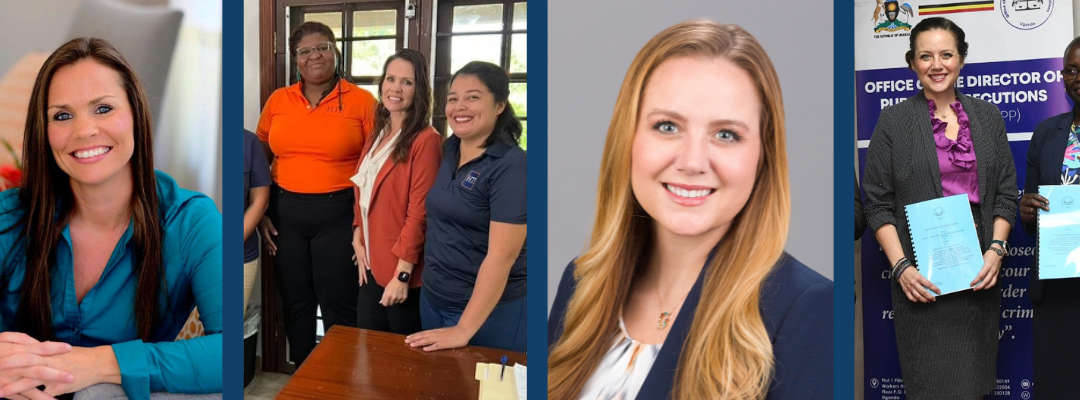My name is Alyssa Markeim and I am a third-year law student at the University of South Carolina in Columbia, South Carolina. As part of my Douglass Fellowship with the Human Trafficking Institute, I hosted a symposium entitled Human Trafficking: From Prosecution to Survivor Support at the University of South Carolina School of Law on Monday, March 18th. The symposium was an all around success with 14 presenters and over 100 in-person and virtual attendees. It was incredible to have so many strong voices from the anti-trafficking field in one space and to come together to work towards combating human trafficking.

Each of the presenters touched upon different aspects of human trafficking, from victim services to prosecutions. Lindsey Lane, Director of Strategic Engagement at HTI, shared about HTI’s Domestic Strategic Engagement Training Program and data collection HTI collects to guide trainings and build out the Federal Human Trafficking Report.
Following Lindsey, Elliott Daniels from the U.S. Attorney’s Office shared his insights as to the federal prosecution of human trafficking and spoke on a South Carolina labor trafficking case study.
Kinli Abee and Megan Raymer of the South Carolina Attorney General’s Office presented on the state prosecution side of human trafficking and the problems South Carolina is facing with placing survivors of human trafficking in safe spaces within South Carolina due to a lack of funding and resources.
Dr. Liyun Zhang of the South Carolina Children’s Law Center presented her studies of identifying and responding to child victims of human trafficking in South Carolina.
Lucyana Roldan of the U.S. Department of Labor, and Abdalis Toro of the South Carolina Department of Employment and Workforce, together educated attendees on labor trafficking, immigration issues that human trafficking survivors face, the ability to recover lost wages, and other resources their offices offer to survivors of labor trafficking.
Professor Aleksandra Chauhan, Ph.D., a South Carolina criminal practice clinical professor at the University of South Carolina Joseph F. Rice School of Law, spoke on the increased issues that youth survivors of human trafficking face and how they are often criminalized and revictimized. She also spoke on a pilot, voluntary specialty court that is going to be implemented within Charleston County, South Carolina. The speciality court’s main focus is to prevent criminalization and victimization of youth survivors of human trafficking by diverting criminal charges and connecting youth with an interdisciplinary team of service providers.
Sydney Ford and Anne Ross of Charleston Pro Bono Legal Services and the Lincoln Tubman Foundation joined the symposium virtually to speak on the importance of trauma-informed lawyering to prevent revictimization, as well as the attorney referral network that Charleston Pro Bono Legal services has implemented. The attorney referral network through Charleston Pro Bono connects human trafficking survivors with a pro bono attorney to assist them with their legal needs.




The symposium concluded with four survivor support organizations (SWITCH, Jasmine Road, Lighthouse for Life, and Doors to Freedom) from across South Carolina, speaking as to how their organizations support survivors of human trafficking.
Furthermore, attendees were provided three key resources: (1) Human Trafficking Victim Identification Card; (2) Indicators & Industries Quick Reference Sheet; and (3) South Carolina Human Trafficking Law Quick Reference Sheet. I am confident that attendees walked away with an increased awareness of human trafficking and at least three tangible tools to assist in combating human trafficking and providing support to survivors of human trafficking.
A recording of the symposium is available here.




